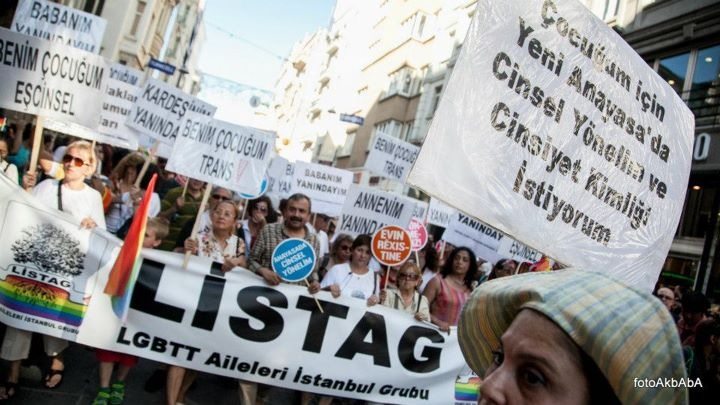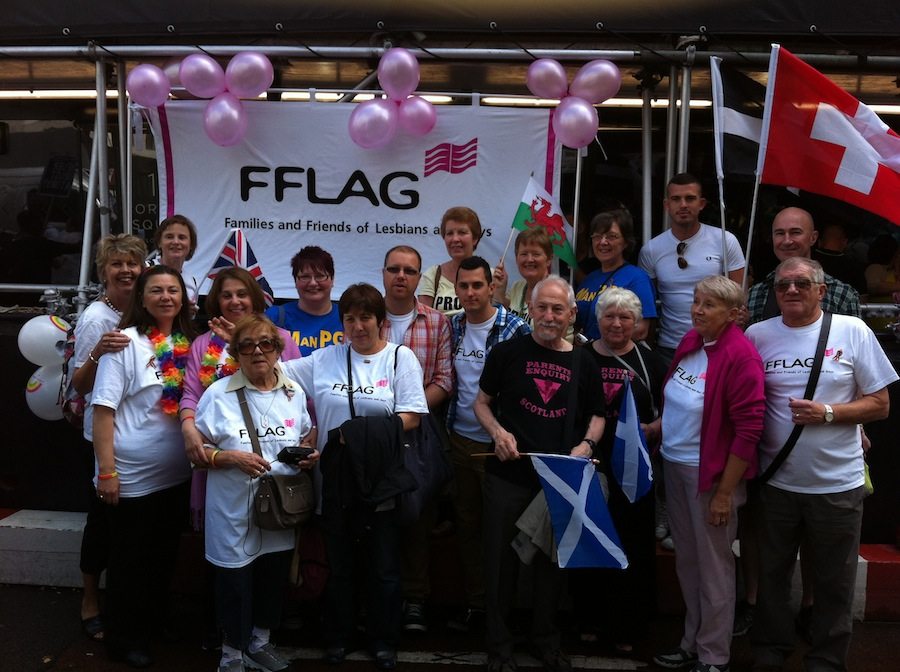“Will he change?”
Let’s have a coffee

“Mum, don’t ask me questions the answers to which you won’t like,” he would say every time she confronted him about staying overnight at his partner’s house on Saturday nights, which he’d been doing for several years. His mum insisted nevertheless. “Mum sensed,” he says. “Parents don’t want to see it, but they always sense. By asking questions, she wanted to clear her mind. Because she did not know exactly what she was to face.”
“After coming to the meetings, parents realise they are not the only ones with gay children”
One night she asked him: “I know you love him. But is that normal love, son?” He replied: “Mum, in Turkey many people don’t consider it ‘normal’.” In shock, she burst into tears, tears he couldn’t control. From that moment on, mother and son lived as two foreigners in the same house, barely speaking to each other. And every Saturday, he would go to stay at his partner’s.
Hasan Metehan Özkan is one of the founders of LISTAG, an Istanbul-based voluntary support and solidarity group for families of LGBT (lesbian, gay, bisexual, transgender) people. In Turkey, the law does not protect people against discrimination on sexual orientation or gender identity grounds. Hate crime is not uncommon, institutionalised and everyday discrimination is a reality, and homophobia is rife. “Homophobia and transphobia kill people in Turkey,” Özkan says. It killed sixteen people in 2010, and at least six in 2012.
The group’s meeting place, the feminist Amargi Cafe, is now closing down as a result of self-criticism and the need for reinvention, but its activities will no doubt continue: hundreds of people are or have been involved with LISTAG since its founding in 2008. Özkan says there is no accurate information available for families of LGBT people who often perceive their children’s sexuality, by default, as “immoral”, “wrong”, and “shameful”. In desperation, he translated an English leaflet for his mother the night they stopped talking. She wouldn’t read it.
Özkan’s activism started in the 2000s, when he was working on social projects at university. During a trip to Sicily, he met Jenny Broughton and Paola Dall’Orto, activist mothers for gay people’s families in the UK and Italy, respectively. “It was the first time in my life when I could openly cry on a mother’s shoulder,” Özkan says. Having started a PhD in social anthropology, he decided to be brave. “Academic research only stays in the library,” he says. “I wanted my research to have a positive impact on the society.” He calls it “action research”. And so the LISTAG project started – a challenge for Özkan himself, for he decided his support group would also help him come out to his own mother, then in her early seventies.
After discussions with other LGBT activists in Istanbul, his first point of contact was Sema, mother of a gay man who had been interviewed by a newspaper a couple of years before. He called her and explained the idea. “I’m in,” she said without hesitation. An acquaintance pulled their mother in, one more joined by coincidence, and suddenly “it was like a snowball”, Özkan says. The group would hold meetings attended by psychiatrists, to help the mothers (mostly it’s mothers, although fathers, siblings, aunts and a granny attend too) share their feelings and experiences, and by doing so learn to accept their child as they are, and be proud of them.
“It’s recommended to come out to one’s parents while still living together, otherwise once you leave, they will be left with a hot potato,” Özkan says. “When they find out, they feel like their child has gone and a stranger has moved in. They mourn. It takes time for them to accept that their child is still the same person, only with that one thing they didn’t know before.”
“It was the first time in my life when I could openly cry on a mother’s shoulder”

His own mother, however, continued to resist for a long time. “But I didn’t give up,” Özkan says. Neither did he fall into the destructive trap of self-denial. “I said ‘No lies’. No ‘Don’t worry, it won’t happen again’ nonsense. I was honest with her, but at the time, she didn’t want to listen. I was lucky to have my other mothers [the group’s mothers] around, though. My mother would call me and ask, ‘Where are you?’ I would reply, ‘I’m with my mothers’. This way, I made her jealous. I showed her that she could lose me.”
Slowly, the approach was working. One day, as Özkan was having coffee with the support group, his mother called. Gathering all his courage, he passed the phone to Sema, one of the group’s mothers. “Will he change?” his mum asked Sema, sobbing. “Let’s have a coffee,” came the reply.
The main problem is stubbornly limiting cultural norms and “What will the neighbours say?!” attitudes.
Some time later, Özkan’s mother accompanied him and his partner to Rome and London Prides, waving a “Proud of a gay kid” poster from the top of a pink bus. That conversation over a coffee, as well as many other conversations and group sessions with LISTAG’s parents, had brought her close to him again. “After coming to the meetings, parents realise they are not the only ones with gay children,” Özkan says. “But it’s not group therapy. The real therapy is parents sharing their experiences.”
In Turkey as elsewhere, the main problem for people outside the hetero-normative mainstream is stubbornly limiting cultural norms and “What will the neighbours say?!” attitudes. “It’s cultural hypocrisy. From the outside, Turkey might look like a gay paradise – kisses on both cheeks, warm hugs, gay pop stars on stage are OK – but most Turks wouldn’t want to have a gay person as their neighbour,” Özkan says.
LISTAG has produced Benim Çocuğum (My Child), a crowd-funded documentary film based on interviews with parents from the support group, which premieres in February 2013 (meanwhile, you can watch the fundraising trailer). To understand how much courage it took them to appear on camera, one has to see the movie. Özkan explains: “It’s an age-related project, too. I witnessed so many mothers – housewives, pensioners – regain purpose and meaning in life: to help others by sharing their own experiences, to make their lives better.” Lifting a pint of beer to his lips, he concludes: “Every time I see a mother change, I’m happy.”
8 thoughts on ““Will he change?””
Leave a Reply
You must be logged in to post a comment.








Informative and thought provoking. When will the English vocabulary get rid of the term ‘queer’?
Hasan Metehan Ozkan has not only given new hope to his relationship with his own mother, or with his other ‘parents’ in LISTAG but he has successfully spread his courage and radiated his enthusiasm, even beyond Turkish borders. We in Malta, the Drachma Parents’ Group, have drawn much inspiration from LISTAG and wish to publicly thank Metehan for his unceasing dedication. :)
Nice to read about such examples from the Balkans where homophobia is high. This is a drop into the ocean and I hope the LISTAG example can be reproduced through out other geographies.